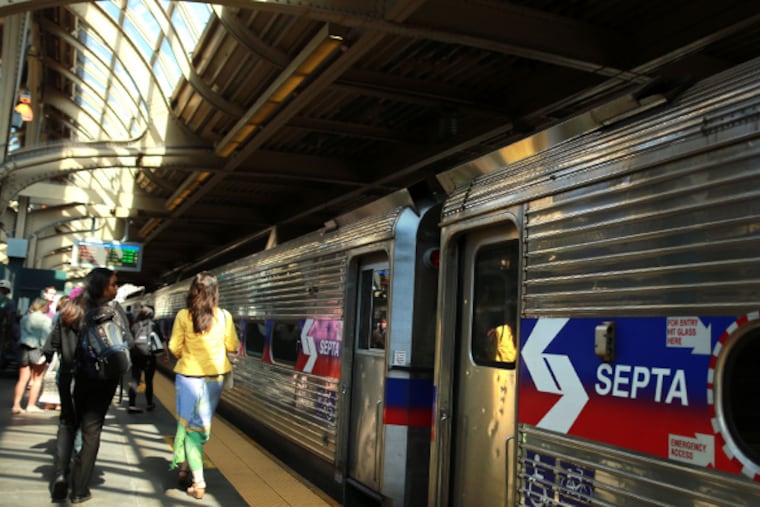With strike over, SEPTA riders exude relief
Leslie Cunnion of Glenside went to bed Saturday knowing the SEPTA strike was over, but that wasn't enough. She woke up extra early so she could listen to the news again and make sure it was true. She volunteers at Liberty USO at the airport serving military families, and it was going to be a hassle to get there without the train.

Leslie Cunnion of Glenside went to bed Saturday knowing the SEPTA strike was over, but that wasn't enough.
She woke up extra early so she could listen to the news again and make sure it was true. She volunteers at Liberty USO at the airport serving military families, and it was going to be a hassle to get there without the train.
Later Sunday morning, she found herself happily waiting at the Market East Station for the airport train that did, indeed, arrive.
"I'm thrilled they're back," she said.
The train rolled in on time and she climbed aboard, along with a reasonable collection of other passengers for a weekend.
Her relief was echoed throughout the station as SEPTA's 13 Regional Rail lines returned to normal after the one-day strike by rail engineers and electrical workers, the first in 31 years. President Obama intervened Saturday, signing an executive order to appoint an emergency board to mediate the dispute between SEPTA and the Brotherhood of Locomotive Engineers and Trainmen plus the International Brotherhood of Electrical Workers. The workers must stay on the job for 240 days while mediators try to forge an agreement.
SEPTA spokeswoman Jerri Williams said all but one engineer on the Doylestown line scheduled to work Sunday morning showed up. She said that "can happen anytime and is not necessarily related to the strike."
Arthur Davidson, general chairman of IBEW System Council No. 7, said the union was preparing for its presentation to the emergency board. A date has not been set, but he said the meeting likely would be held in about two weeks.
Davidson said he was hopeful the emergency board's recommendation would lead to a favorable agreement. "We're very confident that our position has merit," he said.
After the board makes a recommendation, SEPTA and the unions will have 120 days to reach an agreement, Davidson said. If they don't, Obama will appoint a second emergency board. After it makes a recommendation, the parties will be required for another 120 days to try to agree. If they still can't work out a contract, the unions will be free to strike again.
Commuters and businesses whose employees rely on SEPTA had been bracing for a tough workweek. On a typical weekday, about 60,000 people travel on the Regional Rail lines.
Susan Phillips, a senior vice president at Penn Medicine in West Philadelphia, said preparations had been made for a longer strike, but she was glad that was avoided. "We join our patients and staff who depend on SEPTA for their transportation in a sigh of relief that a prolonged strike was averted," she said.
Comcast, whose Center City office is above Suburban Station, told its employees Friday to discuss alternative arrangements with their managers, spokesman John Demming said. On Sunday, it was "pleased" to tell them Monday would be a normal commuting day.
Demming said he takes SEPTA every day from Paoli. His backup plan was a round-trip Amtrak ticket that cost $13. On Sunday, he was debating whether to return it for a refund or hold on to it in case he misses his usual train.
Typically, SEPTA provides 37,500 Regional Rail trips on a Sunday, compared with 126,000 on a workday, Williams said. She said it would be several days before SEPTA would know how many people took the train this weekend.
At the Market East Station, Carmina Wilkerson was awaiting a train Sunday to return home to Middletown, Del., after a weekend with family in Philadelphia. She was worried when she heard about the strike.
"I thought it was the end of the world, because a lot of people, they need transportation to get places," she said.
Wilkerson was pleased the trains were back on schedule. "I was happy," she said. "I could get on a train and go home."
Alex Cooper, a food-service manager who travels to Philadelphia twice a week for business and pleasure, said he was on his way home to Wilmington.
"It broke my heart," he said of the strike. However, his brother works for SEPTA (he wasn't one of the strikers) and Cooper sympathized with the engineers and electrical workers.
"Honestly, I understood what was going on," he said. "They haven't had a contract for four years. There were some key issues with benefits."
As a backup, Cooper was thinking of paying $40 for an Amtrak ticket. "I wouldn't do that often at all," he said. His trip Sunday on SEPTA cost $6.
If the strike had lasted, he said, he would have had to drive:
"I take the train because I don't want to drive."
215-854-4944
@StaceyABurling
science